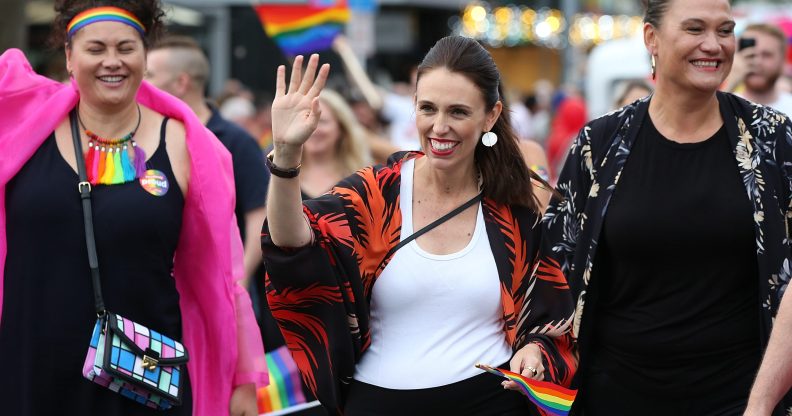Conversion therapy survivors can seek apologies and compensation under New Zealand scheme

New Zealand prime minister Jacinda Ardern at the 2018 Auckland Pride parade. (Fiona Goodall/Getty Images)
Conversion therapy survivors can now seek an apology or even financial compensation from practioners in New Zealand.
The country’s Human Rights Commission launched a free and confidential dispute resolution service for those subjected to the dangerous and discredited practice on Thursday (18 August).
The government-funded Conversion Practices Response Service will allow survivors to easily be connected to support services as well as the police.
Front-line staff may try to resolve any issues early, and if that is not possible, it can go through formal mediation that is voluntary for both parties.
There, the conversion therapy provider may be forced to apologise to the victim, commit to never practising again, attend educational seminars or compensate the victim financially.
If the complaint cannot be resoleved in mediation, the applicant can take the case to the Human Rights Review Tribunal for a decision.
The survivor can be provided with free legal counsel from the Office of Human Rights Proceedings or is free to represent themselves.
“Our service is a formal way to address some of the deep harm experienced by the rainbow community in Aotearoa New Zealand under the guise of conversion practices,” the commission’s conversion practices support services manager, Andre Afamasaga, said.
“It provides a pathway to acknowledge the experiences of survivors and an opportunity to gain some closure. It will help many to begin healing and move forward from their experiences.”
Afamasaga, himself a survivor of 15 years of conversion therapy, said the service is a “significant milestone” for the LGBTQ+ community.
Chief human rights commissioner Paul Hunt agreed.
“Together we are moving closer to an Aotearoa New Zealand where conversion practices no longer happen, and rainbow community members are safe to be who they are, without stigma or anyone trying to change or suppress them,” he said.
The civil redress service was designed with the input of dozens of conversion therapy survivors, LGBTQ+ charity Inside Out told 1News.
“By having people with that lived experience involved, hopefully, it means those coming forward who have experienced conversion practices will get the best experience possible from that service, and feel very heard by people who understand what it’s like,” said the group’s managign director, Tabby Besley.
New Zealand has long been a standard-bearer of LGBTQ+ rights. The country’s parliament near-unanimously passed legislation that banned conversion therapy in February, placing the country in the company of France, Canada and Germany.
Conversion therapy, sometimes known as reparative therapy, has been debunked by much of the world’s medical establishments, including the New Zealand Psychological Society and the NZ College of Clinical Psychologists.
In considering being LGBTQ+ a “disorder”, conversion therapy providers seek to forcibly change a person’s sexual orientation, gender identity and gender expression through methods like electroshock therapy, counselling and violent abuse. Spiritual efforts to do this can include “praying the gay away“, and even exorcism.
The United Nations considers the practice a form of torture given the untold psychological and physical harm it can cause and has advocated for a global ban, a call backed by hundreds of religious leaders.
“We recognise that certain religious teachings have, throughout the ages, been misused to cause deep pain and offence to those who are lesbian, gay, bisexual, transgender, queer and intersex,” the Global Interfaith Commission on LGBT+ Lives initiative said in 2020.
“This must change.”

